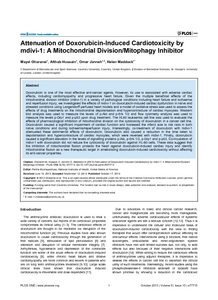Gharanei, M; Hussain, A; Janneh, O; Maddock, H
(2013)
Attenuation of Doxorubicin-Induced Cardiotoxicity by mdivi-1: A Mitochondrial Division/Mitophagy Inhibitor.
PLoS ONE, 8 (10).
e77713 - e77713 (15).
ISSN 1932-6203
https://doi.org/10.1371/journal.pone.0077713
SGUL Authors: Janneh, Omar
![[img]](https://openaccess.sgul.ac.uk/102873/1.hassmallThumbnailVersion/pone.0077713.pdf)  Preview |
|
["document_typename_application/pdf; charset=binary" not defined]
Published Version
Download (2MB)
| Preview
|
Abstract
Doxorubicin is one of the most effective anti-cancer agents. However, its use is associated with adverse cardiac effects, including cardiomyopathy and progressive heart failure. Given the multiple beneficial effects of the mitochondrial division inhibitor (mdivi-1) in a variety of pathological conditions including heart failure and ischaemia and reperfusion injury, we investigated the effects of mdivi-1 on doxorubicin-induced cardiac dysfunction in naïve and stressed conditions using Langendorff perfused heart models and a model of oxidative stress was used to assess the effects of drug treatments on the mitochondrial depolarisation and hypercontracture of cardiac myocytes. Western blot analysis was used to measure the levels of p-Akt and p-Erk 1/2 and flow cytometry analysis was used to measure the levels p-Drp1 and p-p53 upon drug treatment. The HL60 leukaemia cell line was used to evaluate the effects of pharmacological inhibition of mitochondrial division on the cytotoxicity of doxorubicin in a cancer cell line. Doxorubicin caused a significant impairment of cardiac function and increased the infarct size to risk ratio in both naïve conditions and during ischaemia/reperfusion injury. Interestingly, co-treatment of doxorubicin with mdivi-1 attenuated these detrimental effects of doxorubicin. Doxorubicin also caused a reduction in the time taken to depolarisation and hypercontracture of cardiac myocytes, which were reversed with mdivi-1. Finally, doxorubicin caused a significant elevation in the levels of signalling proteins p-Akt, p-Erk 1/2, p-Drp1 and p-p53. Co-incubation of mdivi-1 with doxorubicin did not reduce the cytotoxicity of doxorubicin against HL-60 cells. These data suggest that the inhibition of mitochondrial fission protects the heart against doxorubicin-induced cardiac injury and identify mitochondrial fission as a new therapeutic target in ameliorating doxorubicin-induced cardiotoxicity without affecting its anti-cancer properties.
Statistics
Item downloaded times since 30 Oct 2013.
Actions (login required)
 |
Edit Item |




